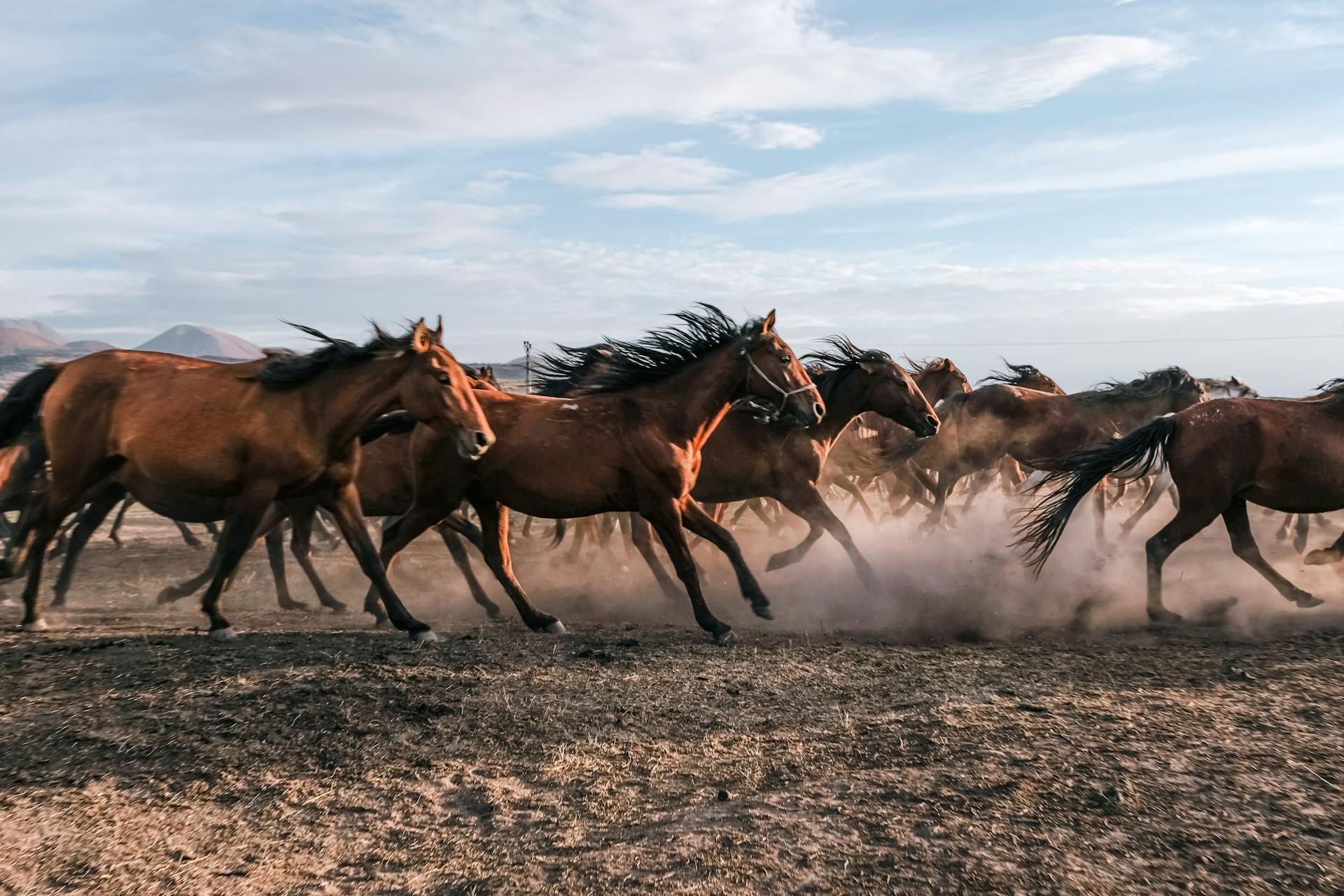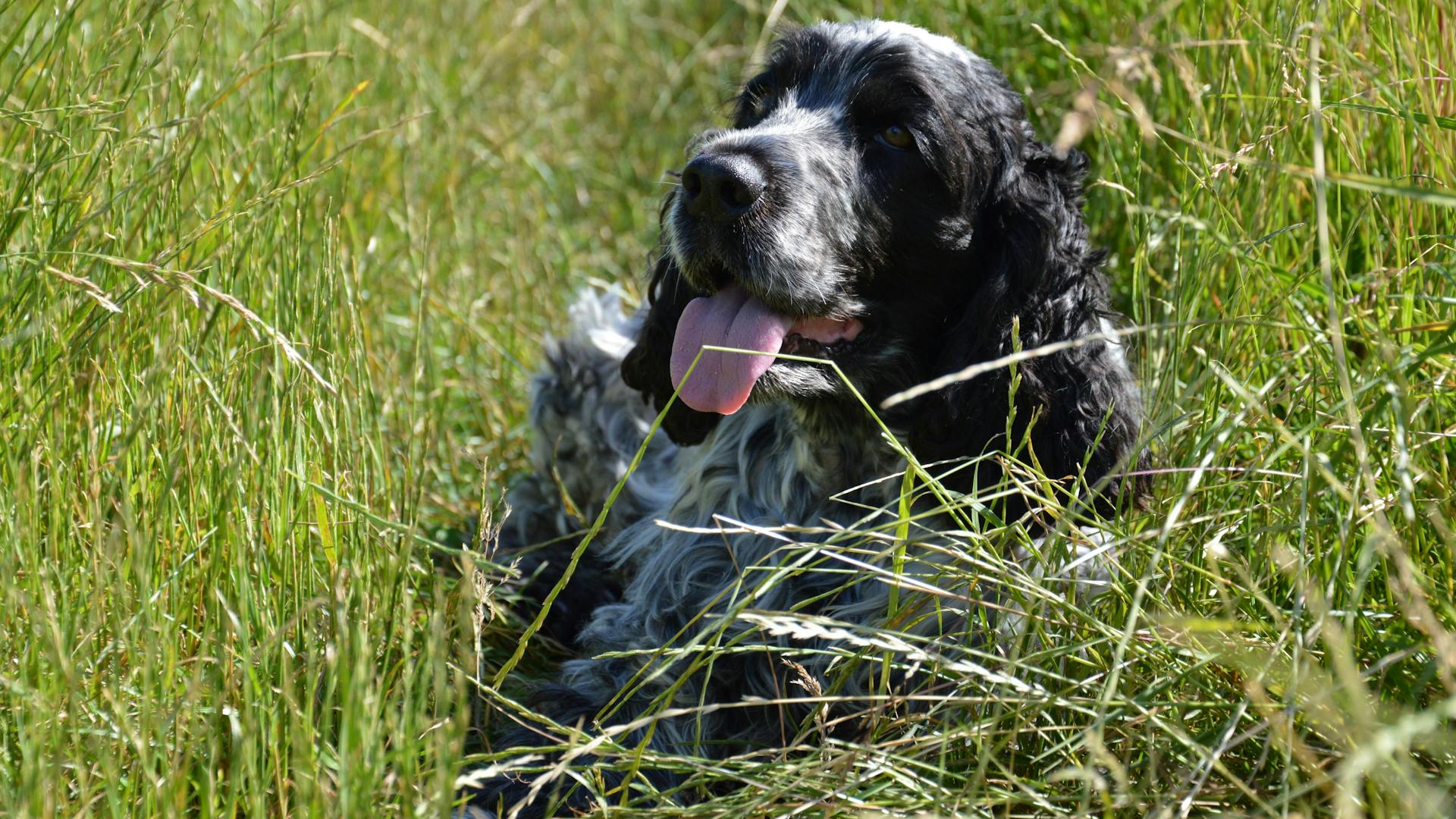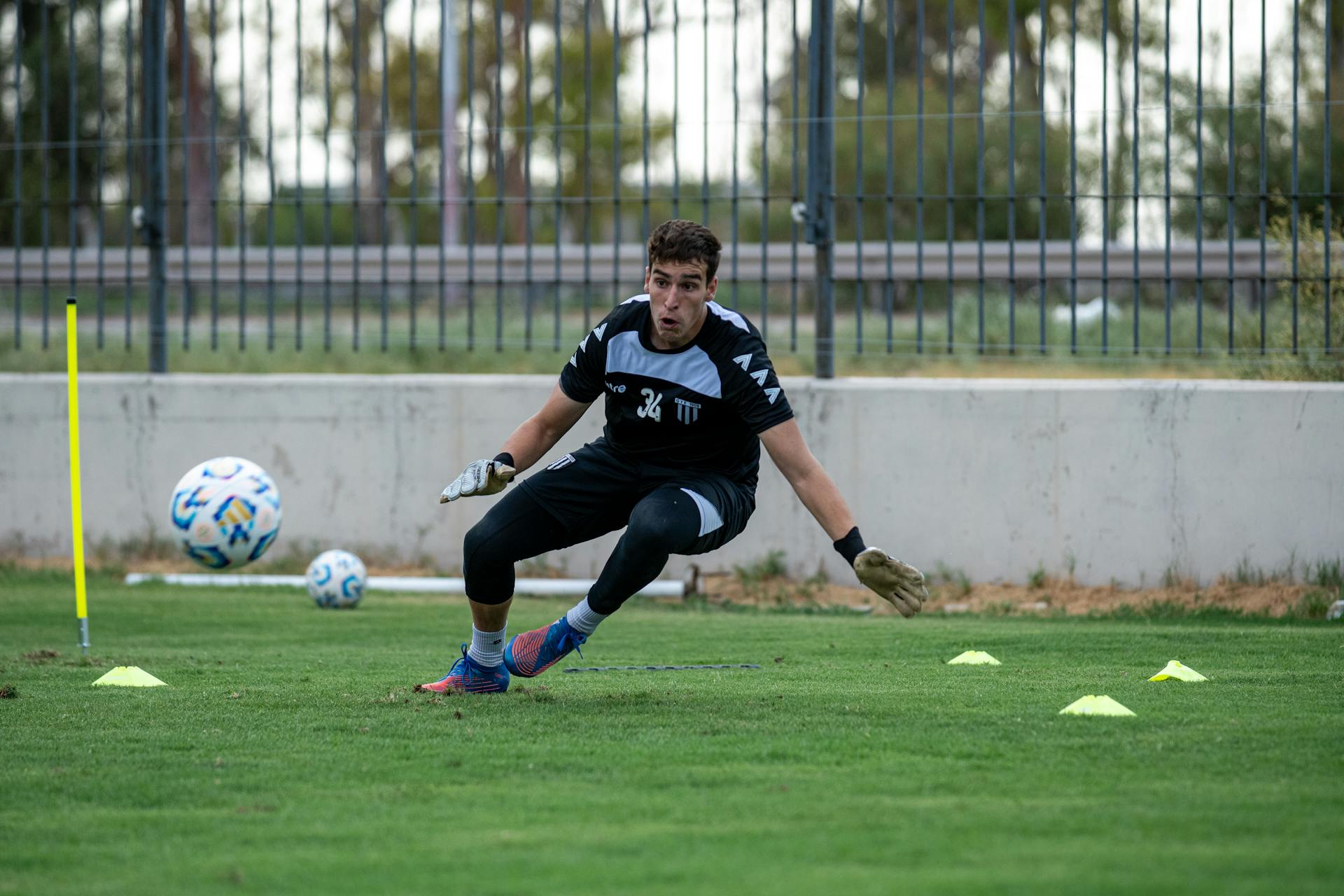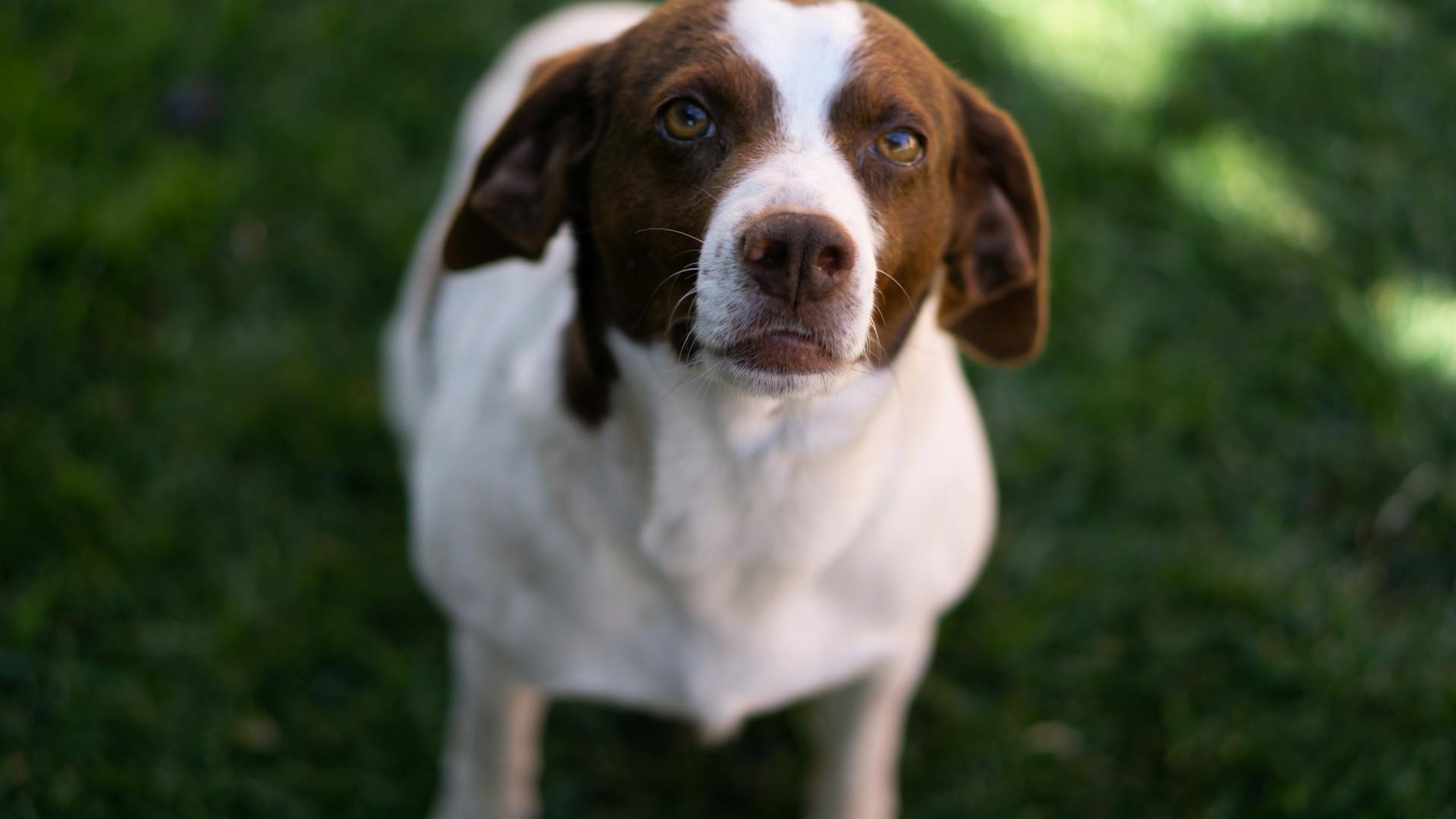
Field trialing is a fun and rewarding experience for both you and your dog. It's a test of your dog's ability to locate and retrieve game, such as birds, over a variety of terrain.
The goal of field trialing is to evaluate your dog's natural ability to find and retrieve game, rather than relying on training. This means that you'll need to work with your dog to develop their instincts and skills over time.
Field trialing typically takes place in a natural setting, such as a forest or field, where game is present. This allows your dog to use their natural hunting instincts to locate and retrieve game.
The first step in preparing for field trialing is to teach your dog to respond to basic commands, such as "whoa" and "come". This will help you to maintain control of your dog during the trial.
A unique perspective: Natural State Dog Training
Key Skills for Field Trialing
A strong finish is crucial in field trialing, as it shows a dog has the stamina to be a solid hunter. A 30-minute run is usually not too difficult for a well-conditioned bird dog, but warm weather can be an issue.
A dog should demonstrate independence in its running style, moving forward ahead of its handler. It should also be cooperative, heeding the handler's commands to turn in a different direction.
A connection between the dog and handler is essential, with the dog keeping tabs on the handler's location. This was evident in a trial I ran with my dog Zara, where she circled back to find me when I was walking instead of on horseback.
A Strong Breakaway
A Strong Breakaway is crucial for a successful field trial. A dog that takes off at a fast speed and runs forward, ahead of the handler, is a good sign.
Ideally, a dog should start hunting immediately after being released. However, it's not uncommon for a dog to stop and sniff around, or circle back to its handler.
Blowing a whistle at the start can help a dog understand when to begin hunting. I've found this technique to be effective with my own dog, Zara.
You might like: Labrador Hunting Dog Training
Cooperation
Cooperation is key in field trialing. A dog should show independence in their running style but also be cooperative with their handler.
Ideally, the dog should heed the handler's commands, such as whistling or calling to turn in a different direction. Continuous "hacking" of a dog is not the goal.
The dog must hunt for its handler at all times at a suitable Gun Dog range, and should show or check in front of its handler frequently. This is stated in the AKC's rulebook for pointing breed field trials.
It's essential for the dog to keep tabs on where the handler is, and not lose sight of them. I've experienced this myself with Zara, who's lost sight of me in high cover and circled back, clearly looking for me.
A Strong Finish
A strong finish is crucial for a field trial dog, demonstrating its stamina to be a solid hunter. This is especially important since most gun dog stakes are 30 minutes long.
A well-conditioned bird dog should be able to complete a run with energy to spare, but warm weather can make this more challenging.
If your dog is struggling to finish strong, it may be worth re-evaluating its conditioning and training to ensure it's ready for the demands of field trialing.
Trialing Essentials
The trial committee is responsible for setting up the trial course, which typically includes a series of marks, blinds, and stakes. This ensures a challenging and fair test of the dog's skills.
The trial course is usually around 1-2 miles long and takes about 30-45 minutes to complete. This allows the dog to get into a rhythm and for the handler to assess their skills.
A good trial dog should be able to quarter the field, which means they should be able to cover a lot of ground and find the birds. This requires a combination of athleticism, nose, and intelligence.
Cost
Trialing can get expensive, especially if you're entering multiple events. Entry fees for AKC hunt tests and field trials typically run about $50–$60 per stake.
You'll need to factor in the cost of gas, accommodations, and food for the weekend. Some clubs will provide food, while others don't.
Field trials often include dinner, which is usually donation-only or a reasonable fee. Breakfast and lunch are usually a separate fee.
Bird costs have risen significantly over the past year. Quail can cost $5+ each, and chukar are $8+ each.
You'll need a good number of birds to train your bird dog effectively, and to fix issues that arise.
Recommended read: Bird Dog Field Trials
Traveling
Packing light is key to making the most of your trip, so consider investing in a high-quality backpack that can hold all your essentials.
Aim to pack clothing that can be easily mixed and matched to create multiple outfits, reducing the need for excess luggage.
The average person checks a bag on flights at least once a month, with 71% of travelers reporting that they pack too much.
Broaden your view: Pack Leader Dog Training
Research your destination beforehand to understand the local culture and dress code, helping you pack more efficiently.
Airlines often charge extra for checked bags, with fees ranging from $25 to $100 per bag, depending on the airline and route.
It's a good idea to pack a portable power bank to keep your devices charged on long flights or while exploring.
Trialing Details
Trials are typically held in the spring and fall, with the exact dates determined by the trial secretary. The trial season usually lasts for several months.
Trials are usually held on private property, such as farms or estates, and are often hosted by the landowner or a local club. The trial is typically held on a specific day, with a set start and end time.
The trial secretary is responsible for organizing the trial, including setting the trial schedule, sending out invitations, and coordinating with the judges and landowners.
Minimal Flush Movement

A field trial dog in gun dog stakes is supposed to be steady to wing and shot, which means they shouldn't move when the bird flies off.
It's a natural tendency for a dog to want to turn to watch the bird, which might mean they take a few steps or turn around to "mark" it. That's allowed, but ideally you don't want your dog moving much at all.
No forward movement, like a hop forward, is what you're aiming for. In some cases, the bird will fly behind the dog or they won't have a clear sightline to watch it fly off, which can make it harder for them to remain steady.
It's not uncommon for a dog to take a few steps or turn around to "mark" the bird, but ideally you want to discourage this behavior.
Additional reading: Crate Training Steps
The Test/Trial Weekend
The Test/Trial Weekend can be a long and unpredictable experience. You'll likely get a running order ahead of time, but it's never an exact science of when your dog will run.
Events typically start around 7-8am and go until dusk (4-5pm), so be prepared for a long day. You'll need to bring plenty of food, water, and snacks for both you and your dog.
If you have an RV, it'll provide some protection from the elements, but don't count on it. You'll still need to be prepared for hot weather, cold weather, and rainy weather with appropriate clothing, footwear, and extra towels.
Your dog will need a lot of patience for these events, as they'll spend a lot of time waiting to run. They'll need to get used to being in a crate or on a stakeout for a long period of time.
At most events, you'll have to keep your dog on a leash when they're not competing. However, some national events may have a training field where you can run your dog off leash.
Here's a rough idea of what to expect in terms of event duration:
Keep in mind that these are just rough estimates, and the actual duration may vary depending on the specific event and number of dogs competing.
Types of
Pointing Breed Field Trials are a dynamic showcase of the innate and trained abilities of the pointing breeds.
These trials are held at local AKC clubs, and you can take classes to prepare, with some clubs offering practice sessions or one-on-one work with your dog.
Pointing Breed Field Trials are a perfect way to stimulate your dog's natural hunting instincts, and thousands of dogs have earned titles since its inception.
You can find a Pointing Breed Field Trial near you by searching for events on the AKC website, with over 22,000 annual events to choose from.
Here are the different types of field trials you can participate in:
Training and Preparation
Training is essential to get your dog prepared for field trialing. Consistency is key, as some dogs may need refresher sessions a few days before an event.
It's not uncommon for dogs to get a bit loose in new situations without an electronic collar for corrections. With Zara, I've found that a refresher session before an event really helps.
You'll want to work on any issues you're having, like Zara's problem with not stopping to flush on a relocated bird. This requires specific training in between events, which can be draining, especially with traveling involved.
Forward Running
Forward running is a crucial aspect of field trials, where you continuously move forward as the handler. In most field trials, there's no bird field, and birds are planted along the course on the edges or areas that naturally hold birds.
In a field trial, your dog should stay out in front of you and keep moving forward, checking back occasionally if needed. According to the AKC rulebook, a gun dog must have a bold and attractive style of running.
Judges want to see a dog that keeps pushing forward at a fast clip, so it's essential to maintain a steady pace. Ideally, your dog should be moving forward with you, not lagging behind or getting stuck in one spot.
A Snappy Retrieve
Retrieving in field trials is judged by looser standards than in NAVHDA or Master Hunter tests, but it's still an important aspect of the competition.
For a dog to excel in retrieving, it's crucial to teach it to respond quickly and efficiently to commands, as seen in the training classes and practice sessions recommended by the AKC.
A good retrieve involves minimal commands, which is why I've emphasized this aspect in my training with Zara, as it's one of her strong points when competing in field trials.
To achieve a snappy retrieve, focus on teaching your dog to respond to a whistle and retrieve and heel, as these skills are essential for success in field trials.
Here's a breakdown of the key elements of a successful retrieve:
By focusing on these key elements and providing regular practice and training, you can help your dog develop a snappy retrieve that will serve you well in field trials.
Training Between Events
Training Between Events is crucial to success, and it's not just about the quantity of training, but also the quality.
Some dogs can run trials or tests in back-to-back weekends and perform well every time. Consistency seems to be the key for these dogs.
A refresher session a few days before an event can be incredibly helpful. This gives you a chance to work on any issues you might be having.
You better believe that's what we worked on before the next Master Hunter test several weeks later, after Zara got picked up for not stopping to flush on a relocated bird.
I often don't enter back-to-back events due to the need for training in between and the drain of traveling.
Featured Images: pexels.com


